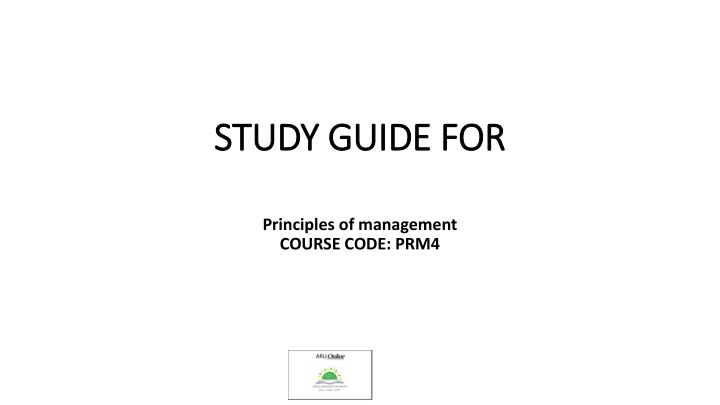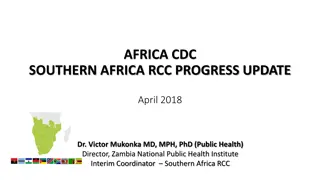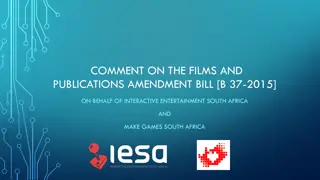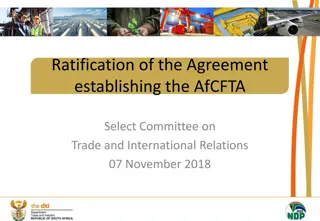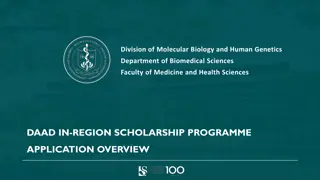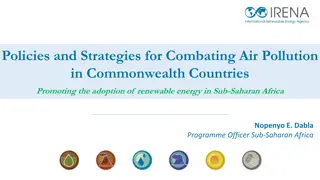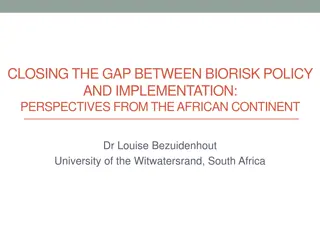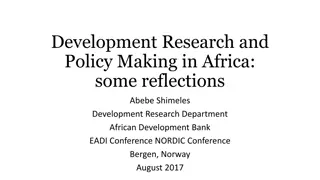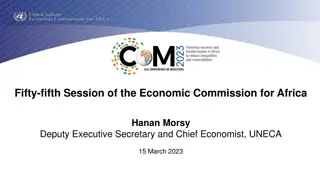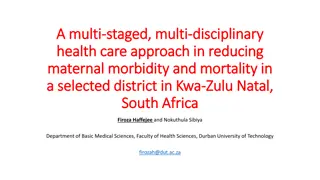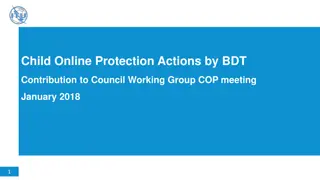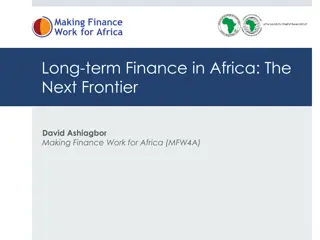Study Guide for Principles of Management Course at Africa Research University (ARU)
Welcome to Africa Research University (ARU)! This study guide is designed to help you navigate through the Principles of Management course (Course Code: PRM4) at ARU. It provides an introduction to the course content, emphasizing the importance of developing management skills to effectively lead and coordinate activities within organizations. The guide covers key topics such as principles of management, personality, attitudes, work behaviors, history, globalization, values-based leadership, and developing mission, vision, and values. Professor Dr. Jakobus Malan, the Vice-Chancellor of ARU, encourages students to start early, study diligently, and strive for success in their educational and professional endeavors. Embrace this opportunity to enhance your understanding of management principles and excel in your academic journey at ARU.
Download Presentation

Please find below an Image/Link to download the presentation.
The content on the website is provided AS IS for your information and personal use only. It may not be sold, licensed, or shared on other websites without obtaining consent from the author.If you encounter any issues during the download, it is possible that the publisher has removed the file from their server.
You are allowed to download the files provided on this website for personal or commercial use, subject to the condition that they are used lawfully. All files are the property of their respective owners.
The content on the website is provided AS IS for your information and personal use only. It may not be sold, licensed, or shared on other websites without obtaining consent from the author.
E N D
Presentation Transcript
STUDY GUIDE FOR STUDY GUIDE FOR Principles of management COURSE CODE: PRM4
1. COURSE INTRODUCTION AND OVERVIEW Welcome to Africa Research University (ARU)! It is with great pleasure that I welcome you to ARU! You are now part of a special group of people a group that looks into the future and sees the sun rising! This is the group of ARU Zambia students working towards their successful future. Yes, our motto is Growth Prosper Excel. That is what I wish for you that you may do well in your studies and future work life through me and my faithful team. ARU endeavours to facilitate strong research-based tertiary education. My intention is to strengthen our students not only in their academic foundation, but also to enable each student to be able to adapt to the present and future global environment. This study guide will assist you in understanding the structure of your module. Start studying early and do your very best. May the sun rise on you! Warm Regards, Prof. Dr. Jakobus Malan ARU Vice-Chancellor
1.2. 1.2.Introduction to the course Introduction to the course We re betting that you already have a lot of experience with organizations, teams, and leadership. You ve been through schools, in clubs, participated in social or religious groups, competed in sports or games, or taken on full- or part-time jobs. Some of your experience was probably pretty positive, but you were also likely wondering sometimes, Isn t there a better way to do this? After participating in this course, we hope that you find the answer to be Yes! While management is both art and science, with our help you can identify and develop the skills essential to better managing your and others behaviours where organizations are concerned.
1.2. 1.2.Introduction to the course Introduction to the course A manager s primary challenge is to solve problems creatively, and you should view management as the art of getting things done through the efforts of other people. The principles of management are the means by which you actually manage, that is, get things done through others individually, in groups, or in organizations. Formally defined, the principles of management are the activities that plan, organize, and control the operations of the basic elements of people, materials, machines, methods, money and markets, providing direction and coordination, and giving leadership to human efforts, so as to achieve the sought objectives of the enterprise.
1.3: Course overview The four key subtopics in this module are: Introduction to principles of management Personality, attitudes, and work behaviours History, globalization, and values-based leadership Developing mission, vision and values
2. 2. GENERAL INFORMATION GENERAL INFORMATION The communication with the University takes place through the Registrar. The contact details are as follows:
Postal address Africa Research University P.O. Box FW 20 Lusaka Physical address Suite 28 Carousel Centre Lusaka Telephone numbers Registrar: +260 95 5 885 672 Student whatsap: +260 96 2 541 331 Student support : +260 97 1 248 101 registrar@aru-online.com office@aru-online.com Email
2.2: Study material 2.2.1: Study pack For successful completion of this module, you should ensure that you have received the following: A study guide Reading material An assessment page 2.2.2: Prescribed textbook The prescribed textbook for this course is Management Principles (version 1) 2.2.3: Errors, omissions and discrepancies The ARU team prides itself in taking special care to prove our students with high quality study materials. Should you notice errors, omissions or discrepancies, please inform the Registrar timeously.
2.3: Proposed study schedule This course has been divided into eight study units an eight-week program. ARU recommends that this program is followed and that you don t fall behind. You have to apply a great deal of self-discipline, otherwise you may be unprepared for the examination.
Week Study unit Topic 1 SU 1 Introduction to principles of management Management tasks, leadership style, entrepreneurship and strategies 2 SU 2 Introduction to principles of management External factors, individuals and groups 3 SU 3 Personality, attitude and work behaviours Personalities and values 4 SU 4 Personality, attitude and work behaviours Work attitudes
Week Study unit Topic 5 SU 5 History, globalisation and value based leadership Ancient history: Management through the 1990s 6 SU 6 History, globalisation and value based leadership Contemporary principle of management 7 SU 7 Developing mission, vision and values The role of mission, vision and values The importance of mission and vision in the P-L-O-C framework 8 SU 8 Developing mission, vision and values Understanding the influence of stakeholders How to compile mission statement
3. COURSE ASSESSMENT METHOD 3.1: Course requirements Students are expected to timeously submit two assignments and write one examination. 3.2: Assignments Your module is administered by the Registrar. You must make sure that you submit the assignment, together with the assignment cover before the deadline indicated in the annual timetable. Assignments may change from year to year and the Registrar s office will be able to provide information on the latest assignments where needed. If you have missed this date, contact the Registrar for a current assignment. Once your assignment has been received by the Registrar, it is forwarded to the lecturer for assessment. The assessed assignment mark is captured, and the assignment is returned to you. If you have any questions, you can arrange to contact your lecturer through the Registrar s office.
3.3: Examinations It is your responsibility to ensure that you know when the examinations are scheduled and submit your assignments in time. Students gain access to the examination through the completion of all the assignments, pre-registering to write a module and by ensuring that their records with the faculty are up to date. Your final mark for this course is compiled as follows: Assignments: 100 marks Exam: 100 marks Total: 200 marks
4. 4. BREAKDOWN OF STUDY BREAKDOWN OF STUDY U UNITS NITS Instructions: Each slide contains one module, with self-assessment exercises Download your module onto your electronic device and read it first. You can download your module by clicking on this icon in each study unit:
4.1: STUDY UNIT 1 THEME: Introduction to principles of management RECOMMENDED READING: Read p. 10-32 of your Module
4.1: STUDY UNIT 1: LEARNING OBJECTIVES LEARNING OBJECTIVES After completion of this chapter, you should be able to: 1. Know the dimensions of the planning, organizing, leading, controlling framework 2. Understand what performance means at the individual and group levels
4.1: STUDY UNIT 1: SELF QUESTIONS QUESTIONS After studying the appropriate text of the Recommended reading section, summarise each chapter in your own words. Be able to answer the following questions: What are Mintzberg s ten managerial roles? What is entrepreneurship? Why do organisations need managers? SELF- -ASSESSMENT ASSESSMENT
4.2: STUDY UNIT 2 THEME: Introduction to principles of management - external factors, groups and individuals RECOMMENDED READING: Read p. 33-58 of your Module.
4.2: STUDY UNIT 2: LEARNING OBJECTIVES After completion of this chapter, you should be able to: Define economic, social and environmental performance Understand how economic performance I related to social and environmental performance
4.2: STUDY UNIT 2: SELF-ASSESSMENT QUESTIONS After studying the appropriate text of the Recommended reading section, summarise each chapter in your own words. Be able to answer the following questions: Why is financial performance important for organisations? How does CSR relate to the triple bottom line? What differentiates a team from a group?
4.3: STUDY UNIT 3 THEME: Personality, attitudes and work behaviour RECOMMENDED READING: Read p.59-87 of your Module.
4.3: STUDY UNIT 3: LEARNING OBJECTIVES After completion of this study unit, you should be able to: Understand the roles of personality and values in determining work behaviours Describe the relationship between personality and work behaviours Describe the biases of self-perception
4.3: STUDY UNIT 3: SELF-ASSESSMENT QUESTIONS After studying the appropriate text of the Recommended reading section, summarise each chapter in your own words. Be able to answer the following questions: What are some methods that companies can use to assess employee personality? Explain the process and perception and how it affects work behaviour Define the concept of person-organization fit and how it affects work behaviours What are the unique challenges of managing employees who have low self-efficiency and self-esteem?
4.4: STUDY UNIT 4 THEME: Personality, attitudes and work behaviour-work attitudes RECOMMENDED READING: Read p. 88-112 of your Module
4.4: STUDY UNIT 4: LEARNING OBJECTIVES After completion of this study unit, you should be able to: Describe work attitude Identify two ways companies can track attitudes in the workplace
4.4: STUDY UNIT 4:SELF-ASSESSMENT QUESTIONS After studying the appropriate text of the Recommended reading section, summarise each chapter in your own words. Be able to answer the following questions: What is the difference between performance and organizational citizenship behaviour? As a manager, how would you improve someone s performance? List several important factors influencing job satisfaction and organizational commitment Do you think making employees happier at work is a good way of motivating people? Motivate
4.5: STUDY UNIT 5 THEME: History, globalization and values based leaderships - ancient history RECOMMENDED READING Read p. 113-128 of your Module.
4.5: STUDY UNIT 5: LEARNING OBJECTIVES After completion of this study unit, you should be able to: Understand the history of principle of management Describe how globalization is affecting management principles and practices
4.5: STUDY UNIT 5: SELF-ASSESSMENT QUESTIONS After studying the appropriate text of the Recommended reading section, summarise each chapter in your own words. Be able to answer the following questions: What goals seem to dominate early management principles? What aspects of PLOC would be mostly likely to change based on what you have learned in this section? Why does social networking inspire people?
4.6: STUDY UNIT 6 THEME: History, globalization and value based leadership - contemporary principles of management RECOMMENDED READING: Read p. 129-148 of your Module.
4.6: STUDY UNIT 6: LEARNING OBJECTIVES After completion of this study unit, you should be able to: Discuss the top 10 ways that the world is changing Describe how cultural dimension affects business management decisions Indicate ethics changes that manager mangers likely face
4.6: STUDY UNIT 6: SELF-ASSESSMENT QUESTIONS After studying the appropriate text of the Recommended reading section, summarise each chapter in your own words. Be able to answer the following questions: What advantages do you see from a global workforce? How would you prepare workers for an overseas assignment? What are the consequences of unethical behaviour?
4.7: STUDY UNIT 7 THEME: Developing mission, vision and values RECOMMENDED READING: Read p.149-164 of your Module.
4.7: STUDY UNIT 7: LEARNING OBJECTIVES After completion of this study unit, you should be able to: Understand the roles of vision, mission ad values in the planning process Develop statement that articulate organizational mission and vision Understand the roles of vision and mission in the PLOC framework
4.7: STUDY UNIT 7: SELF-ASSESSMENT QUESTIONS After studying the appropriate text of the Recommended reading section, summarise each chapter in your own words. Be able to answer the following questions: What is vision statement? How do mission and vision relate to firm s strategy? Which aspects of controlling do mission and vision influence?
4.8: STUDY UNIT 8 THEME: Developing mission, vision and values-influence for stakeholders and mission statement RECOMMENDED READING: Read p. 165-200 of your Module.
4.8: STUDY UNIT 8: LEARNING OBJECTIVES After completion of this study unit, you should be able to: Understand how creativity relates to vision Develop some creativity tools Illustrate map stakeholders and their level of participation Learn about stakeholders and their importance
4.8: STUDY UNIT 8: SELF-ASSESSMENT QUESTIONS After studying the appropriate text of the Recommended reading section, summarise each chapter in your own words. Be able to answer the following questions: What is passion? Why is passion relevant to vision and mission statement? What are the risks of not conducting stakeholder analysis as an input to the formulation of your mission and vision?
Assignment 1 1. each task serve? What are the management tasks that comprises the P-O-L-C.? What function does 10 2. Name and discuss the big five personality traits 10 3. and how do the two concepts relate to each other? What is the difference between job satisfaction and organizational commitment, 5 4. on the organization Discuss the three dimensions of organizational performance and their importance 15 5. minimise the level of absenteeism that take place? What are the major causes of absenteeism at work and how can companies 10 Total 50
Assignment 2 1. 2. decision-making process 3. What is the role of mission and vision in strategic human resource management?5 4. Define creativity and explain creativity tools and indicate why creativity is relevant to the vision and mission statement10 5. Name and explain the components you would take to help your organisation to become a learning organization. What are the advantages of virtual organisations?10 6. Explain what the mission statement is and discuss the six guiding principles 10 Total 50 What is a stakeholder analysis and explain the three identification steps? 5 Discuss the importance of ethics in management and the steps in an ethical 10
